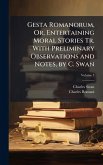Gesta Romanorum; Or, Entertaining Moral Stories is a collection of anecdotes and tales compiled in Latin, likely in the late 13th or early 14th century. This edition, translated from the Latin, offers a fascinating glimpse into the medieval mindset, presenting a range of stories used by monks for fireside recreation and as illustrative examples in their sermons. Volume 1 provides a selection of these tales, each followed by moral interpretations designed to provide religious instruction and ethical guidance. The stories themselves vary widely, drawing from classical mythology, historical events, and folk traditions. This work offers valuable insight into the cultural and intellectual landscape of the medieval period, showcasing the methods used to impart moral lessons and entertain audiences. With its accessible language and instructive purpose, "Gesta Romanorum" remains a compelling read for those interested in medieval literature, religious history, and the art of storytelling. This work has been selected by scholars as being culturally important, and is part of the knowledge base of civilization as we know it. This work was reproduced from the original artifact, and remains as true to the original work as possible. Therefore, you will see the original copyright references, library stamps (as most of these works have been housed in our most important libraries around the world), and other notations in the work. This work is in the public domain in the United States of America, and possibly other nations. Within the United States, you may freely copy and distribute this work, as no entity (individual or corporate) has a copyright on the body of the work. As a reproduction of a historical artifact, this work may contain missing or blurred pages, poor pictures, errant marks, etc. Scholars believe, and we concur, that this work is important enough to be preserved, reproduced, and made generally available to the public. We appreciate your support of the preservation process, and thank you for being an important part of keeping this knowledge alive and relevant.
Bitte wählen Sie Ihr Anliegen aus.
Rechnungen
Retourenschein anfordern
Bestellstatus
Storno








